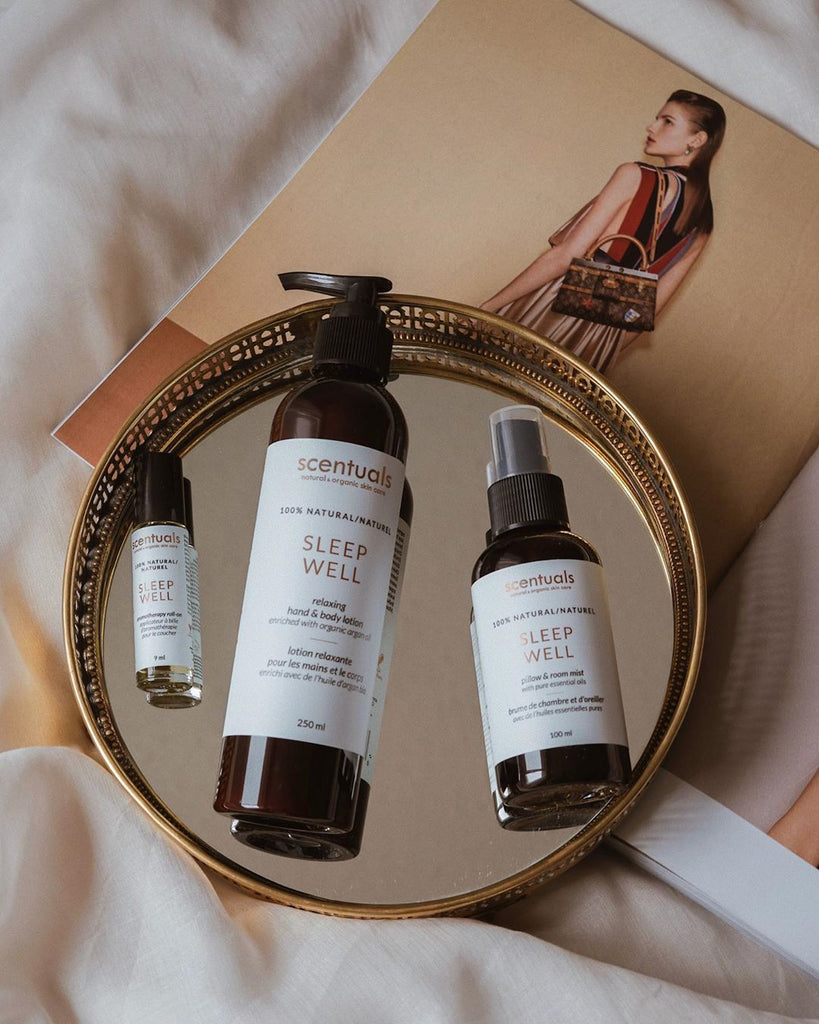Happy World Sleep Day!

Getting quality sleep helps your mind and body function better – improving your overall health, wellbeing, and performance.
We understand that the daily hustle and bustle of life can strain our ability to get the quality sleep that we need! That’s why we created our Sleep Well Collection to help prep your mind and body for a good night’s rest!
Here’s 7 tips on how to improve your sleep:
1. Maintain a consistent sleep schedule 🗓 ⏰ 💤
Consistency is key! Go to bed and wake up at the same time every day (yes, even on the weekends or your days off). This maintains the timing of your body’s internal clock and can help you fall asleep and wake up more easily. Everyone’s body is different – some of us need more or less sleep than others. Generally, adults need between 7 to 9 hours of sleep per night.

2. Separate your sleep space from your workspace 🛏 ≠🧑💻
With increasing work from home measures in place, it can be hard to draw the line between work and rest. It is important to not bring your work to your bed. Your mind and body should recognize your bed as a place of relaxation – not work. By designating separate sleep and workspaces, your mind and body will be able to distinguish between sleep time and work time, allowing you to fall asleep more easily.
3. Have a dark night and a bright day ☀️🌙 🕯
No, we’re not talking about Batman….we’re reminding you to dim the lights at night and soak up the light during the day! Light influences your body’s circadian rhythm – your body’s natural sleep-wake cycle or “internal clock.”
During the day, the sunlight signals our body to feel more awake. When the sun goes down, it tells our body that it is time for bed. Today, we are busier than ever and adopting a “wake up with the sun” approach is not realistic. Plus, depending where you live, at certain times of the year it gets dark by 5pm (or even earlier)!
To mimic the bright sunlight, simply turn on the lights if it's dark during the day and dim them when you are ready to wind down for bed. If it is really bright at night where you live, try to use blackout curtains to block out sleep disrupting light when it’s bedtime.
4. Avoid screens before bedtime 📵 💻 🙅
Avoiding using your phone, computer, tablet, and watching TV 1 to 2 hours before bed. Most screens emit blue light which hinders your body’s ability to produce the “sleep hormone,” melatonin. Melatonin regulates your circadian rhythm and signals your body to feel more tired in the evening. This means blue light before bedtime makes it more difficult for you to fall asleep.
Put away all devices that emit blue light before you go to bed. Try to place your phone away from your bedside table or even leave it in another room. If you use your phone as your alarm clock, try to switch to a digital alarm clock or turn off your phone’s notifications at night. These steps will minimize distractions and limit any temptations to use your phone or other electronic devices at night to promote better, less disrupted sleep.
Try to get out of bed if you struggle with falling asleep instead of squeezing in one more episode or scrolling through social media. Remember, your bed should be designated for sleep. Try to do a calming activity, like reading a book or meditating to ease your mind before bed.

5. Maintain a balanced diet and stay hydrated 🥬 🥑🚰
Fuelling your body with the proper nutrients is good for maintaining your physical and mental health. Eating a balanced diet improves your energy levels, memory, sleep quality, and also boosts your mood. It is also important to drink plenty of water as dehydration can make you feel tired and affect your mood (have a sip of water right now, your body will thank you).
Sugar, processed foods, caffeine, and alcohol can negatively affect your sleep quality. Eating a diet full of sugar and processed foods doesn’t nourish your body with adequate nutrition needed to sustain your energy levels throughout the day – making caffeinated beverages even more tempting for a quick pick-me-up. While caffeine boosts mental alertness, it is only temporary and will lead to an energy crash. It can create a vicious cycle where we rely on substances like coffee to get us through the day.
Coffee has stimulating effects that disrupts our ability to feel sleepy when it’s time for bed. This decreases our overall sleep quality, making us even more tired the next day. Avoid caffeinated beverages after 2 pm or at least 7 hours before bed to prevent its sleep-disrupting effects from keeping you up at night.
6. Stay active 🏃🤸♂️ 🚴♀️
It is important to stay active regularly. Adults should get at least 150 minutes of moderate to vigorous physical activity a week.
Be mindful of the time and intensity of your physical activity. If possible, try to finish your workout at least 1 hour before bed. Vigorous intensity exercises such as running, weight training, or jumping rope elevates your heart rate, making it more difficult to fall asleep. If you decide to exercise before bed, try to do light to moderate intensity exercises, such as yoga, walking or stretching.

7. Bedtime routine 🧴 🛁 🛏
Creating a bedtime routine calms your mind and prepares you for bed. Take a warm bath, sip a warm caffeine-free drink, read a book, journal, or use some soothing body products. Our 100% Natural Sleep Well Collection is made with a blend of nourishing organic Argan oil and sleep-inducing chamomile, lavender, ylang ylang, and jasmine to help ease your mind and body so you can drift off into a restful slumber.

